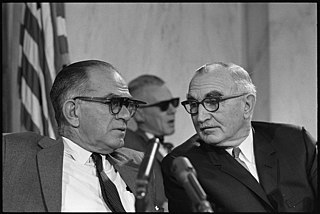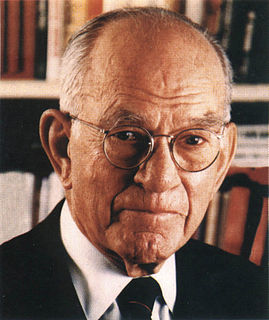
Robert Carlyle Byrd was an American politician who served as a United States Senator from West Virginia for over 51 years, from 1959 until his death in 2010. A member of the Democratic Party, Byrd previously served as a U.S. Representative from 1953 until 1959. He is the longest-serving U.S. Senator in history. In addition, he was, at the time of his death, the longest-serving member in the history of the United States Congress, a record later surpassed by Representative John Dingell of Michigan. Byrd was the last remaining member of the U.S. Senate to have served during the presidency of Dwight Eisenhower, and the last remaining member of Congress to have served during the presidency of Harry S. Truman. Byrd is also the only West Virginian to have served in both chambers of the state legislature and both chambers of Congress.

The Twenty-sixth Amendment to the United States Constitution prohibits the states and the federal government from using age as a reason for denying the right to vote to citizens of the United States who are at least eighteen years old. It was proposed by Congress on March 23, 1971, and ratified on July 1, 1971, the quickest ratification of an amendment in history.

John Cornelius Stennis was a U.S. Senator from the state of Mississippi. He was a Democrat who served in the Senate for over 41 years, becoming its most senior member for his last eight years. He retired from the Senate in 1989.

The Fulbright Hearings refers to any of the set of U.S. Senate Foreign Relations Committee hearings on Vietnam conducted between 1966 and 1971. This article concerns those held by the U.S. Senate in 1971 relating to the Vietnam War. By April 1971, with at least seven pending legislative proposals concerning the war, the Senate Foreign Relations Committee, chaired by Democratic Senator J. William Fulbright of Arkansas began to hear testimony. The 22 hearings, titled "Legislative Proposals Relating to the War in Southeast Asia", were held on eleven different days between April 20, 1971, and May 27, 1971. The hearings included testimony and debate from several members of Congress, as well as from representatives of interested pro-war and anti-war organizations.
The Hughes–Ryan Amendment was an amendment to the Foreign Assistance Act of 1961, passed as section 32 of the Foreign Assistance Act of 1974. The amendment was named for its co-authors, Senator Harold E. Hughes (D-Iowa) and Representative Leo Ryan (D-CA). The amendment required the President of the United States to report all covert actions of the Central Intelligence Agency to one or more Congressional committees.

Operation Menu was the codename of a covert United States Strategic Air Command (SAC) bombing campaign conducted in eastern Cambodia from 18 March 1969 until 26 May 1970 as part of both the Vietnam War and the Cambodian Civil War. The targets of these attacks were sanctuaries and Base Areas of the People's Army of Vietnam and forces of the Viet Cong (NLF), which utilized them for resupply, training, and resting between campaigns across the border in the Republic of Vietnam. The impact of the bombing campaign on the Khmer Rouge guerrillas, the PAVN, and Cambodian civilians in the bombed areas is disputed by historians.

The Cambodian Campaign was a series of military operations conducted in eastern Cambodia during 1970 by the United States and the Republic of Vietnam as an extension of the Vietnam War and the Cambodian Civil War. The invasions were a policy of President Richard Nixon; 13 major operations were conducted by the Army of the Republic of Vietnam (ARVN) between 29 April and 22 July and by US forces between 1 May and 30 June.

The Imperial Presidency, by Arthur M. Schlesinger, Jr., is a book published in 1973 by Houghton Mifflin. This book details the history of the Presidency of the United States from its conception by the Founding Fathers through the latter half of the 20th century. The author wrote the book out of two concerns: first, that the US Presidency was out of control and second, that the Presidency had exceeded its constitutional limits.

The presidency of Richard Nixon began on January 20, 1969, when Richard Nixon was inaugurated as the 37th President of the United States, and ended on August 9, 1974 when he resigned from office, the first U.S. president ever to do so. A Republican, Nixon took office after the 1968 presidential election, in which he defeated Hubert Humphrey, the then–incumbent Vice President. Four years later, in 1972, he won reelection in a landslide victory over U.S. Senator George McGovern.
The Military Assistance Command Vietnam’s Studies and Operations Group (MACVSOG) was United States’ largest and most complex covert operation since the Second World War. More commonly referred to as SOG, the CIA conducted secret operations in Cambodia and Laos for eight years as part of the conflict against Communist North Vietnam.

Vietnam Humanitarian Assistance and Evacuation Act of 1975 was U.S. congressional legislation proposed to designate financial resources for the evacuation and humanitarian aid of South Vietnam preceding the Fall of Saigon. The Act of Congress was to grant the 38th President of the United States a U.S. monetary fund as immediate foreign assistance for the South Indochina liberation movement during the military offensive by the People's Army of Vietnam, People's Liberation Armed Forces of South Vietnam, Viet Cong, and Viet Minh into Cochinchina.

















